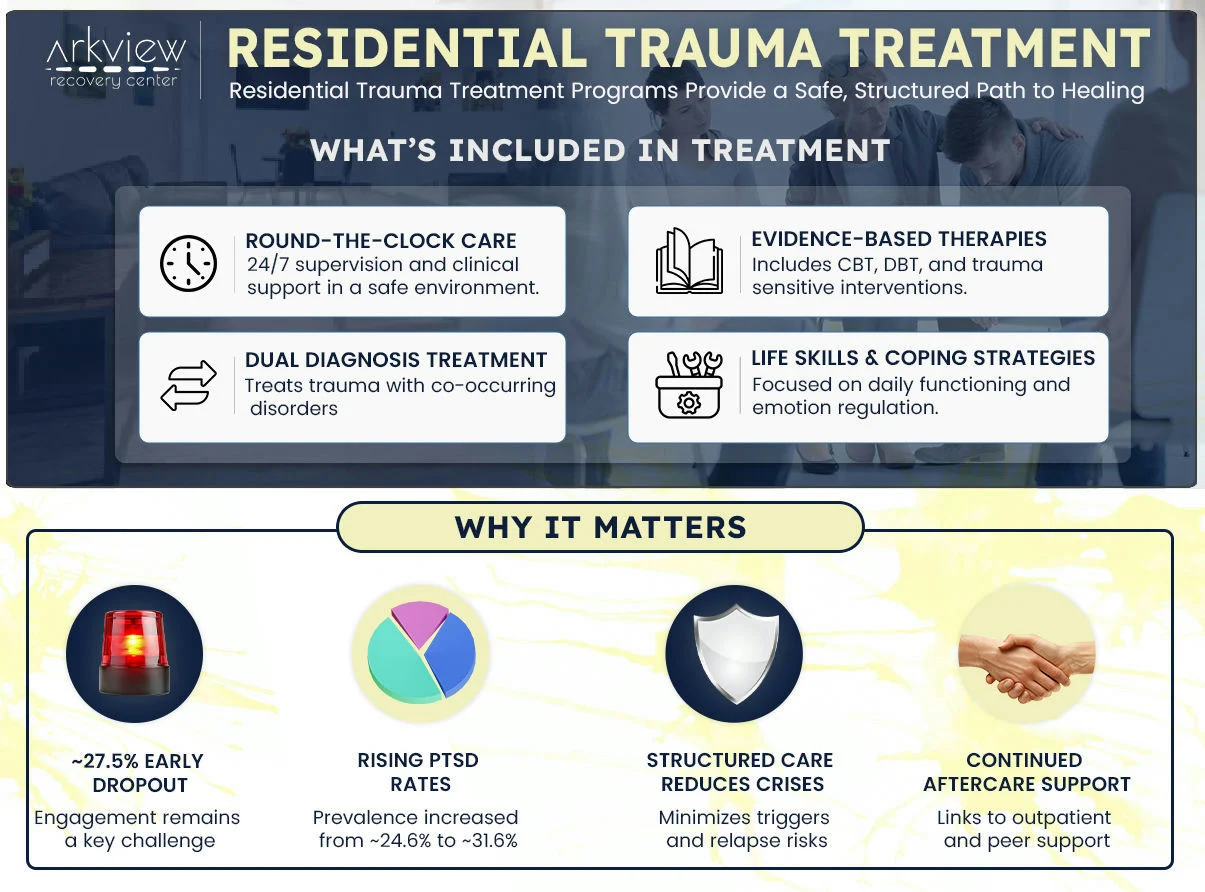Left untreated, trauma can lead to painful memories, difficulty controlling emotions, and unintended behaviors that make living a normal, healthy life challenging.
Residential trauma treatment programs in Pennsylvania provide 24/7 support for individuals struggling with the effects of trauma. These programs offer intensive care when outpatient therapy isn’t enough to manage daily life or maintain safety. At Arkview Behavioral Health, we understand that trauma recovery requires comprehensive, evidence-based mental health care in a supportive environment where healing can begin.
If you’ve experienced trauma and find yourself unable to cope with everyday activities, having frequent flashbacks, or turning to substances for relief, residential treatment might be the next step in your recovery journey. These programs combine proven therapies with round-the-clock support to help you process traumatic experiences and develop healthy coping strategies. Arkview is committed to providing trauma-informed care that addresses your unique needs and helps you reclaim your life.
- Abuse: This includes verbal, physical, sexual, or emotional abuse.
- Childhood neglect: If you were not well taken care of as a child or were ignored, this can be a traumatic experience.
- Combat: Soldiers who have experienced military combat or police officers involved in an exchange of gunfire may be more likely to develop PTSD.
- Domestic violence: Even if you weren’t the victim of violence, simply being around during incidents of it may traumatize you. Some people might also have been held captive by someone at some point.
- Surviving an act of nature: A tornado, hurricane, or earthquake can leave survivors in a state of trauma.
- Surviving a car or plane accident: Similarly, any physical accident you survive may also be traumatic, especially if other people involved didn’t survive.
This is by no means an exhaustive list. However, it is clear that traumatic experiences are extreme and damage a person’s ability to process what they lived through.
Typically, an experience or event is processed by an individual and then stored as a positive or negative memory. When trauma goes unprocessed, it can lead to health problems and changes in behavior. Individuals may frequently feel unsafe, struggle with anxiety and depression, experience increased sensitivity to noise, or become reactionary or aggressive at unexpected times. These are common signs of unprocessed trauma and often indicate the need for a professional trauma therapy program and depression counseling Pennsylvania to support emotional healing and long-term recovery.
When Residential Trauma Treatment Becomes Necessary
Several warning signs indicate that residential care may be appropriate:
- Persistent thoughts of self-harm or suicide: When trauma leads to dangerous thoughts about hurting yourself
- Inability to manage daily responsibilities: Struggling to maintain work, school, or basic self-care
- Severe flashbacks or dissociation: Experiencing vivid re-living of traumatic events or feeling disconnected from reality
- Escalating substance use: Using drugs or alcohol to cope with trauma symptoms
- Lack of progress in outpatient therapy: Not improving despite consistent outpatient treatment
Professionals use comprehensive assessments to determine if residential treatment is appropriate. These evaluations consider symptom severity, safety risks, and how well previous treatments have worked.

How Can Therapy Within a Trauma Treatment Program Help?
Trauma therapy can help normalize traumatic situations and give clients the perspective they need to see their trauma as what it is: a natural reaction to a past event. By regularly working with trauma therapists, clients can identify triggers, reduce triggers, and find the coping mechanisms they need to prevent traumatic episodes and begin the recovery process.

Evidence-Based Therapies That Heal Complex Trauma
Cognitive behavioral therapy (CBT) helps you understand how trauma affects your thoughts, feelings, and behaviors. In residential settings, CBT teaches you to recognize negative thought patterns that developed after traumatic experiences and replace them with healthier thinking.
During cognitive-behavioral therapy sessions, you’ll work with your therapist to identify triggers that prompt distressing reactions. You’ll learn specific coping skills to manage these triggers and gradually work through traumatic memories in a safe, controlled environment. Research shows that trauma-focused CBT can reduce PTSD symptoms significantly when delivered in intensive residential settings.
Eye movement desensitization and reprocessing (EMDR) uses guided eye movements while you recall traumatic memories. This process helps your brain reprocess these memories so they become less distressing over time.
Prolonged exposure therapy involves carefully revisiting traumatic memories through talking or imagining exercises. Both EMDR and PE are particularly effective for treating PTSD symptoms like intrusive thoughts and avoidance behaviors.
In a typical EMDR session, you might follow your therapist’s finger movements with your eyes while thinking about a specific traumatic event. This bilateral stimulation helps your brain process the memory differently, reducing its emotional impact.
Trauma doesn’t just affect your mind—it also gets stored in your body. Somatic therapy focuses on the physical symptoms of trauma and helps release tension held in your muscles and nervous system.
Pennsylvania residential programs often include:
- Yoga therapy: Gentle movements that help reconnect you with your body
- Breathwork: Techniques to calm your nervous system and reduce anxiety
- Mindfulness practices: Learning to stay present instead of getting lost in traumatic memories
These body-based approaches complement traditional talk therapy by addressing the physical effects of trauma, such as chronic tension, sleep problems, and hypervigilance.
What to Expect in a Residential Trauma Treatment Program
Your typical day might include morning mindfulness sessions, individual therapy appointments, group therapy focused on trauma processing, and evening recreational activities. The structured environment helps reduce anxiety while giving you consistent opportunities to practice new coping skills.
Residential trauma treatment components include:
- Individual therapy sessions: Usually 2-3 times per week for personalized trauma treatment
- Group therapy: Processing experiences with others who understand trauma
- Skills groups: Learning practical tools for managing emotions and stress
- Family therapy: Involving loved ones in your healing process when appropriate
The physical environment is designed for comfort and safety, with secure facilities, comfortable living spaces, and 24/7 staff supervision. Many programs also include outdoor spaces and wellness amenities to support your overall recovery.
Insurance Coverage and Treatment Duration
To verify your coverage, contact your insurance provider or speak with the admissions team at the trauma treatment center you’re considering. Many facilities have staff who specialize in helping you understand your benefits and navigate the approval process.
For those without adequate insurance coverage, Pennsylvania offers programs like Behavioral HealthChoices for eligible individuals. Some treatment centers also offer sliding-scale fees or payment plans based on financial need.
The Reality of Post-Traumatic Growth
Common areas of growth include stronger relationships, greater personal resilience, a deeper appreciation for life, and enhanced coping skills. While healing takes time, many people begin noticing improvements within the first few months of intensive treatment.
Signs of healing might include fewer nightmares, improved sleep, better concentration, and a feeling of greater hope for the future. Recovery isn’t linear; you’ll have good days and challenging days, but overall progress tends to continue over time.
Treating Trauma Alongside Other Conditions
Dual diagnosis treatment addresses:
- Substance use disorders: Understanding how trauma and addiction influence each other
- Depression and anxiety: Treating mood disorders that often accompany trauma
- Eating disorders: Addressing trauma-related relationships with food and body image
Integrated treatment means addressing all conditions simultaneously rather than treating them separately. This approach leads to better outcomes because trauma often underlies other mental health and substance use issues.
Frequently Asked Questions About Residential Trauma Treatment
Look for programs with trauma-specialized staff, evidence-based therapies such as EMDR or trauma-focused CBT, and accreditation from organizations such as The Joint Commission or CARF.
Pack comfortable clothing, personal hygiene items, and any prescribed medications. Leave valuables, electronics, and sharp objects at home, as most facilities have restrictions on these items.
No, you set the pace for trauma processing with your therapist. Programs prioritize establishing safety and trust before working directly with traumatic symptoms and memories.
Facilities maintain 24/7 staffing with crisis-trained professionals, use secure environments, and follow trauma-informed care principles that prioritize your emotional and physical safety.
You’ll receive a detailed aftercare plan that may include outpatient therapy, support groups, or step-down programs to help maintain your progress after leaving residential care.
Recovery from trauma takes courage, but you don’t have to face it alone. Arkview Behavioral Health provides comprehensive residential trauma treatment using evidence-based treatments tailored to your unique needs. Our experienced team understands the complexity of trauma recovery and is committed to supporting you every step of the way. Contact us today to learn more about how we can help you begin your healing journey.

Arkview Offers Trauma Treatment in Pennsylvania
However, traumatic events and prolonged stress can trigger traumatic episodes in anyone and hamper their ability to function in daily work, home, or school life. Without professional trauma treatment, many will turn to alcohol or drugs to self-soothe and alleviate the symptoms of post-traumatic stress disorder or depression, but this only creates a further problem by opening the door to addiction and co-occurring disorders.
At Arkview, we understand that the effects of trauma can be long-lasting and detrimental to long-term health. If you’ve experienced trauma or are experiencing signs of prolonged stress and PTSD, we can help. Contact us now to enroll in our program today!






















